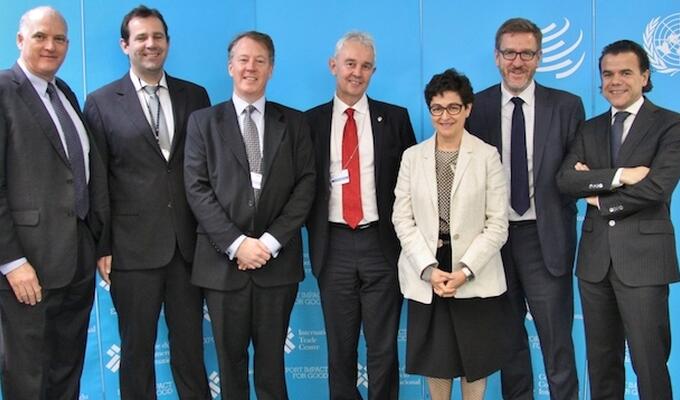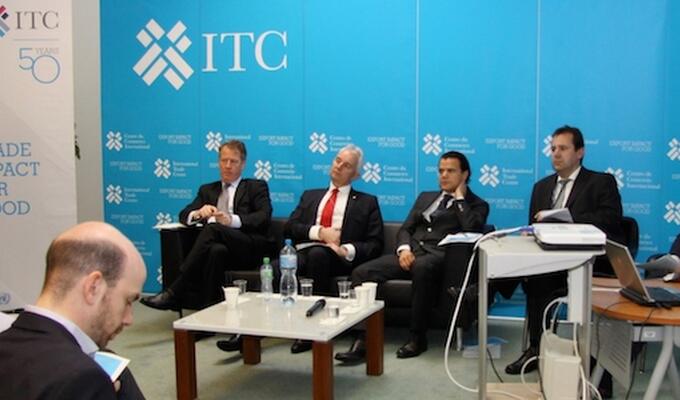

L'adaptation et le partage des connaissances sont la clef de la compétitivité des PME (anglais)
For small and medium-sized enterprises (SMEs) in developing countries to become globally competitive, they must adopt and adapt new knowledge to create innovative products and services, said panellists at a discussion organized by the International Trade Centre (ITC) at its headquarters in Geneva on 2 May 2014. Speaking on the topic of ‘SMEs innovate to trade and compete’ were representatives from multinational companies, international organizations and academia.
‘The nature and quality of the linkages of SME suppliers with their multinational buyers, as well as linkages among clusters of SMEs and other support institutions, are decisive factors for SME innovation,’ said Mr. Anders Aeroe, Director of ITC’s Market Development Division, who moderated the event.
The focus of the discussion was on ways to foster innovation through different linkages and relationships among enterprises, buyers and suppliers, institutions and value chains.
‘It’s about applying knowledge. You don’t need a lot of resources or technology to upgrade. I never see technology doing the change – it’s the organizations and people that decide how that will be put in place,’ said Gerald A. McDermott, Associate Professor of International Business, Darla Moore School of Business, University of South Carolina. ‘You need a lot of coordination among actors. To accelerate learning, they need to learn from others.’
Mr. McDermott added that the key is to identify common resource needs and strategies among producers, suppliers and institutions to foster knowledge sharing and coordinated actions in a sector or value chain, enabling SMEs to become more competitive.
Representatives of multinational companies – Nestlé, ADM Cocoa and Bosch – provided examples of ways in which the private sector is promoting SME competitiveness.
Nestlé, a global nutrition, health and wellness company, is set to double the amount of coffee bought directly from farmers to 180,000 tons by 2015, said John Bee, Public Affairs Communications Manager, Nestlé SA. The company will also distribute 220 million high-yielding, disease-resistant coffee plantlets to farmers by 2020. The goal is to enable more farmers to take advantage of the benefits of technological developments so they can more efficiently and easily produce high-quality goods.
‘We’ve gone from a process of reporting what we do to forwarding that to support rural development and development of the agricultural supply chain,’ said Mr. Bee.
All of ADM Cocoa’s suppliers are SMEs or individual farmers, according to Michiel Hendriksz, Director of Global Sustainability, ADM Cocoa, one of the world's largest processers and suppliers of cocoa and chocolate products. He said one area that could be further developed is the grouping of farmers to foster continued growth. Hendriksz cited the case of Côte d'Ivoire where only 15% of farmers are organized into cooperatives. He noted that when farmers work in groups, this improves knowledge sharing, which upgrades processes along the cocoa supply chain.
‘Our main issue is not standards anymore,’ said Mr. Hendriksz. ‘The big problem today in making it sustainable is conformity; it is impact assessment.’ He said the issue is not just about helping SMEs to understand the requirements, but about building their capacity to meet standards through the sharing of knowledge and best practices.
Bosch, the global engineering and electronics company, is driven by innovation, said Helmut Wlcek, who has worked as Vice President of Logistics and is now Director for Value Stream Services at the Karlsruhe Service Research Institute. Bosch applies for 5,000 patents every year. There are two drivers of innovation, said Mr. Wlcek. The first is technology push, the second is market pull. While multinational companies are better able to make use of the latest technology (technology push), SMEs are better equipped to understand local requirements (market pull).
‘You have to understand where that person stands, which is better done by individuals, not multinational companies,’ Mr. Wlcek said. When Bosch had its managers work directly with its partners in Asia to understand local requirements to develop certain products, the resulting products and processes significantly improved.
For both suppliers and lead firms, the top priority is on improving the business environment to facilitate trade, said Michael Roberts, Aid-for-Trade Coordinator, Development Division, World Trade Organization.
According to data presented by Mr. Roberts, access to finance is the top barrier for suppliers in developing countries. For lead firms, the main issue is customs procedures.
In closing the session, Mr. McDermott pointed out the need to build institutional capacity to promote knowledge-sharing. He stated that institutions themselves are resources for knowledge, and that knowledge must be spread among SMEs to foster cohesive actions and joint problem-solving to help accelerate their inclusion in global economies.



